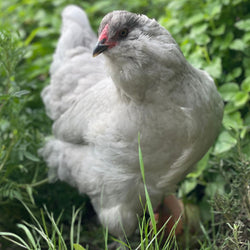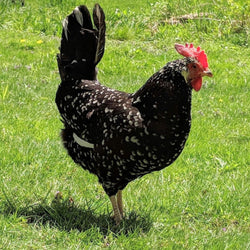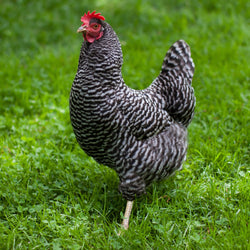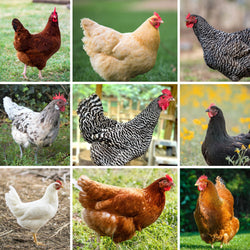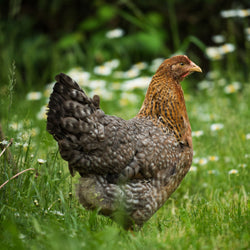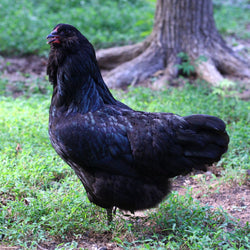page=10/--
Frequently Asked Questions
Here we answer the most commonly-asked questions about ordering, chicken care, and more.
What is a poultry show?
A Poultry Show or exhibition is very much like a dog show. Breeders and fanciers, and sometimes 4-Hers, bring their best chickens to show them at the exhibition and have them judged according to "breed standards," in other words by what the American Poultry Association (APA) says the ideal bird of that breed is like. (Did you know that a lot of the photos you see on our website come from special breeding lines at poultry shows?) APA breed standards outline what color feathers, legs, skin, earlobes and so on the ideal bird should have. It also points out if...
Read MoreWhat is pecking order?
"Pecking order" is the social hierarchy of the chicken flock. Those at the top of the pecking order get the best nesting spots and roosting spots, for instance... and those at the bottom get what's left. Small flock with plenty of space This arrangement works out well so long as there is plenty of space on roosts, in nests, and plenty of food and water for everyone. If there is not enough, then the girls at the low end get picked on, and may not be getting enough to eat and drink. Always make sure your chickens have more than...
Read MoreWhat is a Showgirl Chicken?
A Showgirl is a type of chicken that combines the features of two of the weirdest-looking chicken breeds, Silkies and Turkens! Silkies are small chickens whose feathers lack the barbicels that hold them into a feather shape, so they look (and feel) like they're covered with fur rather than feathers. Silkies also have black skin, a dark beak and eyes, a dark purple (mulberry) comb and turquoise earlobes. Turkens, or naked necks, are regular large fowl chickens that don't have any feathers on their necks, so they bear a passing resemblance to small turkeys. Showgirls look as if they combine...
Read MoreWhat does BBS stand for with chickens?
BBS stands for "Blue-Black-Splash." But that doesn't tell you a whole lot, either, if you don't know how the genetics of blue plumage colors works! When you breed a blue bird to a blue bird, about 50% of the offspring will be blue (a grey color), 25% will be black, and 25% will be splash (a white or pale grey color with splashes of darker grey and black). So, when you order BBS Cochin chicks, for example, you'll receive a mix of blue, black, and splash colors. To get 100% blue birds, you would want to breed black to splash....
Read MoreHow do I raise show quality chickens?
Well, it helps to start with good stock. Have a look at our special lines that are more likely to produce show quality prospects. You may also find good lines with specialized breeders. Just keep in mind that even with the very best lines, not every bird is going to be a winner of shows, not even for experienced exhibitors. Once you've got your stock, you'll want to provide high-quality food, and you may even want to weigh your birds frequently as they grow to make sure they're putting on weight fast enough---but not too fast! Make sure you're familiar...
Read MoreHow can I cope with the loss of my chicken?
First, we're so sorry to hear about the loss of your chicken. Losing any pet is hard, but there's something about having a bird who begs for pets and wants to snuggle on your lap that's just a little magical---the loss can feel completely devastating. And there's no magic bullet, either. Nothing we can say can make the loss of a pet hurt any less. Pet chickens are as much members of the family as other pets are. We empathize. We all keep chickens, so we have all lost chickens before, too. Recently, one employee lost every chicken but one...
Read MoreHow long are roosters fertile?
Like with any animal, this can depend on the particular bird. That said, roosters are sort of like human males: they will probably be fertile most of their lives! And if you have a great rooster, it makes sense to allow him to fertilize eggs for as long as possible to pass on those good genes. Black Frizzle Bantam Rooster If you're worried about whether your rooster is fertilizing eggs, just check your eggs to see if they're fertile. If they are mostly fertile, your rooster is doing his job!
Read MoreHow much protein should be in my chicken feed?
The right protein content in your feed is super important for raising a healthy flock--and commercial rations are probably the easiest way to get the right amount, as well as the right nutrition for your birds. But if that's true, why do different brands have different levels of protein, and what amount in best? There's variation because there's an ideal range of protein content, AND because the range varies based on your birds' ages. Ideal protein for laying breeds based on age Chicks up to 6 weeks old: 20% - 22% protein 7 weeks to point of lay: 14% -...
Read More







"The Clubhouse" Coop
Easy to assemble and built to last, the Clubhouse Coop is the perfect starter coop for a small flock.

